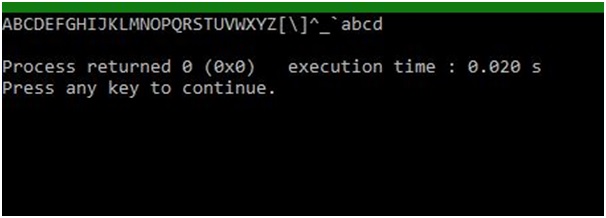如果您在应用程序中处理文件,那么从文件中读取是您不能忽略的事情。因此,函数fgets()会帮助你做到这一点。
该函数用于从文件中读取字符串。该函数只需要三个参数,第一个是字符数组,第二个是要读取的字符数,第三个是文件本身。
例:
fgets (str, 60, F);
//Here, str is a character array, F is the file variable.
它将从光标的当前位置读取文件中的 60 个字符。
stdio.h - C 中的 fgets() 函数示例
#include <stdio.h>
int main()
{
//initializing the file pointer
//and type of variables
FILE* F;
char str[60];
//open file abc in read mode
F = fopen("abc.txt", "r");
if (F == NULL) {
perror("Error is:");
return (-1);
}
if (fgets(str, 60, F) != NULL) {
//printing the output on console
puts(str);
}
fclose(F);
return (0);
}输出

相关用法
- C语言 fgets() and gets()用法及代码示例
- C语言 fgetc()用法及代码示例
- C语言 fgetc() and fputc()用法及代码示例
- C语言 fgetpos()用法及代码示例
- C语言 fread()用法及代码示例
- C语言 feof()用法及代码示例
- C语言 fillellipse()用法及代码示例
- C语言 freopen()用法及代码示例
- C语言 frexp()用法及代码示例
- C语言 fclose()用法及代码示例
- C语言 fseek() vs rewind()用法及代码示例
- C语言 fflush()用法及代码示例
- C语言 fputc()用法及代码示例
- C语言 fputs()用法及代码示例
- C语言 fillpoly()用法及代码示例
- C语言 ftell()用法及代码示例
- C语言 fseek()用法及代码示例
- C语言 fscanf()用法及代码示例
- C语言 ferror()用法及代码示例
- C语言 fwrite()用法及代码示例
注:本文由纯净天空筛选整理自Abhishek Sharma大神的英文原创作品 fgets() function of stdio.h in C。非经特殊声明,原始代码版权归原作者所有,本译文未经允许或授权,请勿转载或复制。
